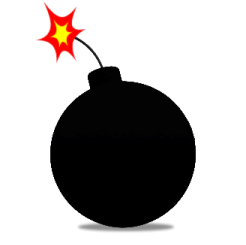By Barry Kavanagh, 17 October 2000
« Introduction | Comics at the present time »
I presume I’m calling you in Northampton
Yeah, that’s right, yeah.
Yeah, I’m calling from Dublin.
Aha.
Is that a Northampton accent?
Um… Probably, yeah… I mean, I’ve lived in Northampton all my life so I guess it’s pretty much a complete dyed-in-the-wool Northampton accent.
Yeah, we’ve got a few different accents in Dublin. I’ve a South County accent, the same accent as Sinead O’Connor… Anyway, I don’t know anything about Northampton. Is it a big place? Is it a city or a town?
It’s a town, I mean it’s as big as some cities but we’ve got the wrong sort of cathedral, so we’re not actually a city – and it’s an interesting place, I mean, I wrote the book Voice of the Fire [which] was largely just about Northampton. It’s very interesting, it’s the largest town, like I say, it’s larger than some cities –
What kind of population?
I couldn’t tell you.
But it’s not a million or anything?
No but there are some cities that are smaller than Northampton. In terms of violent crime, it’s in the lead of places that are far bigger and more notorious, you know? Historically it’s got some interesting kinks to it. It was one point more or less unofficially the capital of Britain.
Of Britain?
Well, of England, certainly. During the Saxon times this would have been the capital but then after that – the royal family were born here, or died here; this was where Mary Queen of Scots was executed; I think this was where Richard III was born; it’s where the War of the Roses was decided; it’s where the English Civil War was decided. As far as I know it’s pretty well exactly equidistant from every coast, which means that it’s right in the centre of the country, so all of the internal wars in England have more or less passed through it, they just had to, you know? So there’s a lot of strange history.
Is it very urban, or are you surrounded by hills or anything?
Well I mean if you get outside of Northampton we’ve got some lovely countryside but you wouldn’t know that from being in the town. It’s very urban, I suppose in a lot of ways it’s a very nondescript midlands town, in that most towns have the same shops, there’s a sort of gradual homogenization where everything does become sort of like a potato print, like a wallpaper design.
Yeah, I’ve been to Leicester
Yeah, in that case you probably know pretty much all you that need to know about Northampton.
[Laughs]. Alright, okay. I was going to start with going through all these comics you’ve written. But first a couple of general things about comics. What do you think of the term “graphic novel” that has come into use?
It’s a marketing term. I mean, it was one that I never had any sympathy with. The term “comic” does just as well for me. The term “graphic novel” was something that was thought up in the ’80s by marketing people and there was a guy called Bill Spicer who used to do a brilliant fanzine back in the sixties called Graphic Story Magazine. He came up with the term “graphic story”. That’s got something to recommend it, you know, I can see “graphic story” if you need it to call it something but the thing that happened in the mid-’80s was that there were a couple of things out there that you could just about call a novel. You could just about call Maus a novel, you could probably just about call Watchmen a novel, in terms of density, structure, size, scale, seriousness of theme, stuff like that. The problem is that “graphic novel” just came to mean “expensive comic book” and so what you’d get is people like DC Comics or Marvel comics – because “graphic novels” were ge
tting some attention, they’d stick six issues of whatever worthless piece of crap they happened to be publishing lately under a glossy cover and call it The She-Hulk Graphic Novel, you know? It was that that I think tended to destroy any progress that comics might have made in the mid-’80s. The companies, the marketing people, who are not terribly bright individuals, they’re not terribly creative, they don’t really have the hang of – well, I mean, they really haven’t got the hang of the 1970s yet, so the 21st century is a long way behind them and they think in very short term measures and consequently they were more or less to blame for destroying whatever kind of momentum the comic book picked up in the ’80s by immediately using it predictably to sell a load of Batman, Spiderman shit. But no, the term “graphic novel” is not one that I’m over-fond of. It’s nothing that I might carry a big crusade against, it doesn’t really matter much what they’re called but it’s not a term that I’m very comfortable with.
The word “novel” is kind of empty anyway, because I mean Ulysses is a novel and so is Jilly Cooper’s Riders.
Oh, exactly. You know, these literary terms, they’ve probably got more to do with… Well, genres. I’m sure the whole idea of genres in fiction was probably invented by some bored stocking clerk at W.H.Smith, fifty years ago or something like that. That everything has to be pigeonholed and packaged. I suppose, you know, “sequential art”, you could call it that but then that’s a bit of a mouthful, really, I mean “comics” is as good as anything.
Yeah, I think that’s the most generic term and also it covers both episodic stuff and the single stories.
Absolutely.

